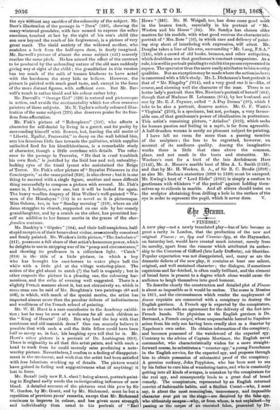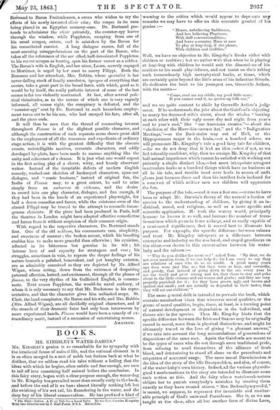Cke glranta.
"FINESSE."
A NEW play—not a newly translated play—has of late become so great a rarity in London, that the production of the new and original Finesse ; or, Spy and Counter-Spy, at the Haymarket, on Saturday last, would have created much interest, merely from its novelty, apart from the rumour which attributed its author- ship to the Countess of Gifford (late Lady Dufferin), nee Sheridan. Popular expectation was not disappointed, and, many as are the dramatic defects of the new play, it contains at least one salient, original, and well sustained character ; the dialogue, if sometimes capricious and far-fetched, is often really brilliant, and the element of broad farce is present to a degree which alone would cause the audience to laugh themselves into good humour.
To describe clearly the construction and detailed plot of Finesse is about as impossible as it would be useless. The scene is Messina in 1811, and the circumstances which render the employment of finesse requisite are connected with a conspiracy to destroy the English garrison. A French spy is expected by the conspirators, in order to conclude an agreement for the delivery of the fort into French hands. The physician to the English garrison is Dr. Bertrand, a French emigre, whose unquenchable hatred to Napoleon arises from his only son having been cruelly shot as a deserter by Napoleon's own order. He obtains information of the conspiracy, and becomes possessed of the watchword of the expected spy. Contrary to the advice of Captain Mortimer, the English naval commander, who characteristically wishes for a more straight- forward course, he substitutes a "counter-spy," a young Frenchman in the English service, for the expected spy, and proposes through him to obtain possession of substantial proof of the conspiracy. A genuine cockney, John Poppleton, who has been sent to sea by his father to cure him of wandering tastes, and who is constantly getting into all kinds of scrapes, is mistaken by the conspirators for the real spy, and consequently leads to a great deal of bread comedy. The conspirators, represented by an English returned convict of fashionable habits, and a Sicilian Count—who, I must say, is about the most meaningless, unnecessary, and impossible character ever put on the stage—are deceived by the false spy, who ultimately escapes—why, or from whom, is not explained—by passing as the corpse of an executed felon, presented by Dr.
Bseitrand to Baron Freitenhoesen, a saran who wishes to try the effects of his newly invented elixir vitt e ; the corpse in its turn being placed in an Egyptian mummy-case. Dr. Bertrand pre- tends to administer the elixir privately, the counter-spy leaves through the window, while Poppleton, escaping from one of his usual scrapes, enters, and is mistaken by the Baron for his resuscitated convict. A long dialogue ensues, full of the most amusing misapprehensions on the part of the Baron, who takes all the references of the mv tified, half-intoxicated Poppleton to his recent scrapes as bearing tpon his former career as a robber. The Baron's wife is English, and her niece, Laara, secretly engaged to Mortimer, is urged by her aunt to marry Filippi. Both the Baroness and her attendant, Mrs. Bobbin, whose specialite is her never-failing stock of family anecdotes, apropos of everything that occurs, take a great part in the broad farce, with which, good as it would be by itself, the really pathetic interest of some of the last scenes is far too violently contrasted. At last, after several poli- tical vicissitudes, as to the nature of which one is very vaguely informed, all comes right, the conspiracy is defeated, and the "counter-spy" sent by Dr. Bertrand to such hazardous employ- ment turns out to be his son, who had escaped his fate, after all, and the piece ends.
It will thus be seen that the thread of connecting interest throughout Finesse is of the slightest possible character, and although the construction of each separate scene shows great skill in the employment of all the resources and expedients of ordinary stage action, it is with the greatest difficulty that the obscure events, unintelligible motives, eccentric characters, and oddly developed by-plots, have been made to assume anything like the unity and coherence of a drama. It is just what one would expect in the first acting play of a clever, witty, and keenly observant writer. Instead of the invariable defects of modern English comedy, washed-out sketches of hackneyed characters, spun-out dialogue, and "comic business," instead of original fun, the faults of Finesse may, to a great extent, be said to arise simply from an embarras de richesses, and the desire to crowd into one play character, dialogue, and fun enough, if they had been in the hands of an experienced playwright, for half a dozen comedies and farces, while the existence even of the absurd Filippi may be traced to the attempt to reconcile incon- gruous elements. If the piece had been produced in Paris, half the theatres in London might have adapted effective comediettas and farces from it without suspicion of their common origin.
With regard to the respective characters, Dr. Bertrand stands first. One of the old noblesse, his consummate ease, simplicity, and sweetness of manner ; the broken accent, which his breeding enables him to make more graceful than otherwise ; his cynicism affected in its bitterness but genuine in its wit ; his intense love of and capacity for stratagem and ruse ; his struggles, sometimes in vain, to repress the deeper feelings of his nature beneath a polished, benevolent, and yet haughty exterior, are as admirably conceived as they are depicted by Mr. Alfred Wigan, whose acting, down from the extremes of despairing paternal affection, hatred, and excitement, through all the phases of finesse, to the very rhythm of his Gallicized English, is consum- mate. Next comes Poppleton, the would-be naval cockney, of whom it is only necessary to say that Mr. Buckstone is his repre- sentative, and that the character gives him unlimited scope. St. Clair, the head conspirator, the Baron and his wife, and Mrs. Bobbin (Mrs. Alfred Wigan), are all decidedly original characters, and if the strands of their dramatic fates had only been interwoven by more experienced hands, Finesse would have been a comedy of ex- traordinary merit, instead of a succession of entertaining scenes.
AMATEUR.































 Previous page
Previous page